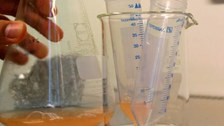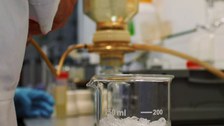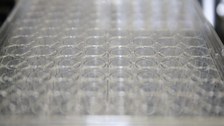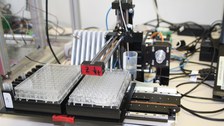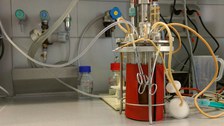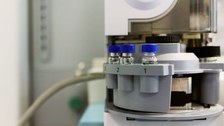Research Group Synthetic Biotechnology and Systems Biology
Classic metabolic engineering relies on the deletion or amplification of enzymatic reactions in metabolic networks to optimize the biosynthesis of a target molecule. Although this technology is a very powerful tool to increase the efficiency of microbial product syntheses its application is limited to the production of compounds that naturally occur in cells.

© Schmidt

© Schmidt
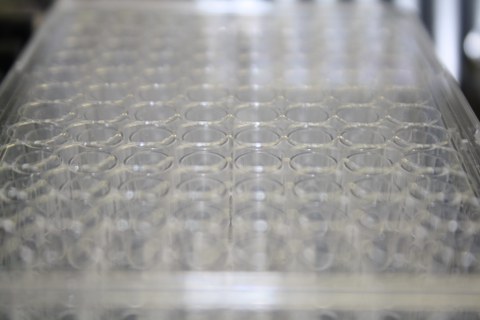
© Schneider
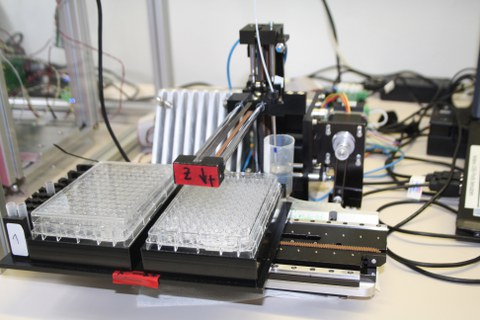
© Schneider
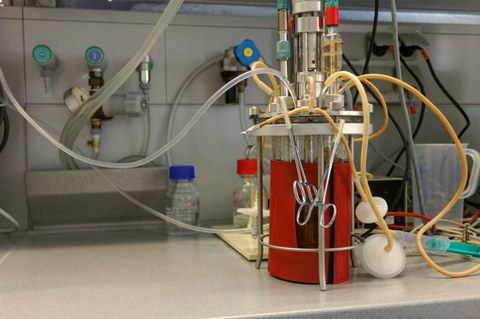
© Schneider
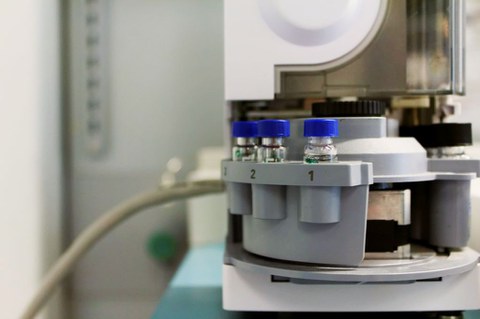
© Schneider
To enlarge the panel of products which can be microbially synthesized or to improve the stoichiometry of their biosynthesis, we conceive synthetic metabolic pathways and implement them using enzyme engineering and metabolic engineering of the production strains.
A main focus of our work lies on the development of synthetic metabolic pathways for the utilization of green ethylene glycol (EG), which can be (electro)chemically derived from CO2 or obtained by hydrogenolysis of lignocellulosic materials. Compared to other potential microbial substrates which can be produced from CO2 (methane, synthesis gas, methanol, formiate) EG provides a number of advantages for developing efficient bioprocesses. In particular, EG-based processes have a lower oxygen demand and are not limited by the phase transition of a gaseous substrate (syngas or oxygen). In addition, our synthetic pathways have a highly attractive stoichiometry regarding the biosynthesis of compounds which contain an even number of carbon atoms.
In addition, we are developing enzyme systems for the regeneration of ATP in cell-free reaction systems. These systems can be coupled with a wide variety of ATP-dependent product syntheses such as, for instance, cell free protein expression.
In our projects we employ computer-aided methods (e.g. flux balance analyses, modelling of enzyme structures) and experimental methods (e.g. 13C-based metabolic flux analysis, metabolome analyses, rational and evolutionary enzyme engineering) to efficiently implement the new pathways and to optimize production strains.
Main focus:
- Synthetic metabolic pathways for the utilization of EG (derived from CO2 or lignocellulose) for microbial product syntheses
- Systems biological analyses of production strains
- Development of ATP-regenerating enzyme cascades for cell-free reaction systems
Projects of the Bioprocess Engineering research group include:
- ScampiLys - Production of lysine from shrimp waste (cooperation with Hanoi University of Science and Technology, funded by BMBF)
- SynBioMet - Use of synthetic biology for the production of 2,4-dihydroxybutyrate (cooperation with ESPCI Paris, INSA Toulouse, Adisseo, funded by SAB)
- Enzyme cascades for cell-free ATP regeneration for the synthesis of valuable substances (funded by ZIM and DFG, cooperation with c-LEcta and University of Hamburg)
- Development of a synthetic metabolic pathway for the carbon-conserving production of acetyl-CoA from ethylene glycol (funded by DFG)
- Enzyme cascades for cell-free ATP regeneration for the synthesis of valuable substances (funded by ZIM, cooperation with c-LEcta)
- CoBioMetal - Combined biotechnological and electrochemical wastewater valorization for metal recovery. Subproject: Systems biology investigation of fungal strains during metal recovery from process wastewater (funded by SAB, cooperation with TU Bergakademie Freiberg)
- KoSyn - Controlled Synergy: Peptide-controlled cell-cell communication of yeasts and bacteria in (bio)technological processes (funded by the ESF, cooperation of the professorships of General Genetics, General Microbiology, Hydrochemistry, all TU Dresden).
Research group head:
 © Ritz
© Ritz
Prof. Dr.-Ing. Thomas Walther
Send encrypted email via the SecureMail portal (for TUD external users only).
Scientists:
 © Mann
© Mann
Project researcher
NameDr. Claudio Frazão
Synthetic Biotechnology and Systems Biology
Send encrypted email via the SecureMail portal (for TUD external users only).
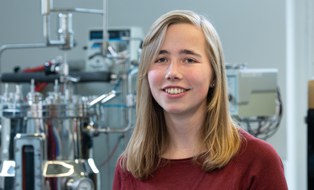 © TUD
© TUD
Project researcher
NameFranziska Kraußer Dipl.-Ing.
Synthetic Biotechnology and Systems Biology
Send encrypted email via the SecureMail portal (for TUD external users only).

Wissenschaftliche Mitarbeiterin
NameMs Laura Lilienthal M. Sc.
Synthetische Biotechnologie und Systembiologie
Send encrypted email via the SecureMail portal (for TUD external users only).

Project researcher
NameDipl.-Ing. Tuyet Anh Stefanie Nguyen
Synthetic biology and systems biology
Send encrypted email via the SecureMail portal (for TUD external users only).
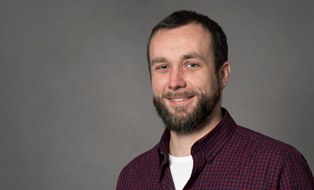 © Mann
© Mann
Project researcher
NameM.Sc. Kenny Rabe
Synthetic Biotechnology and Systems Biology
Send encrypted email via the SecureMail portal (for TUD external users only).

Research associate
NameDipl.-Ing. Elly Straube
Synthetic biology and systems biology
Send encrypted email via the SecureMail portal (for TUD external users only).
